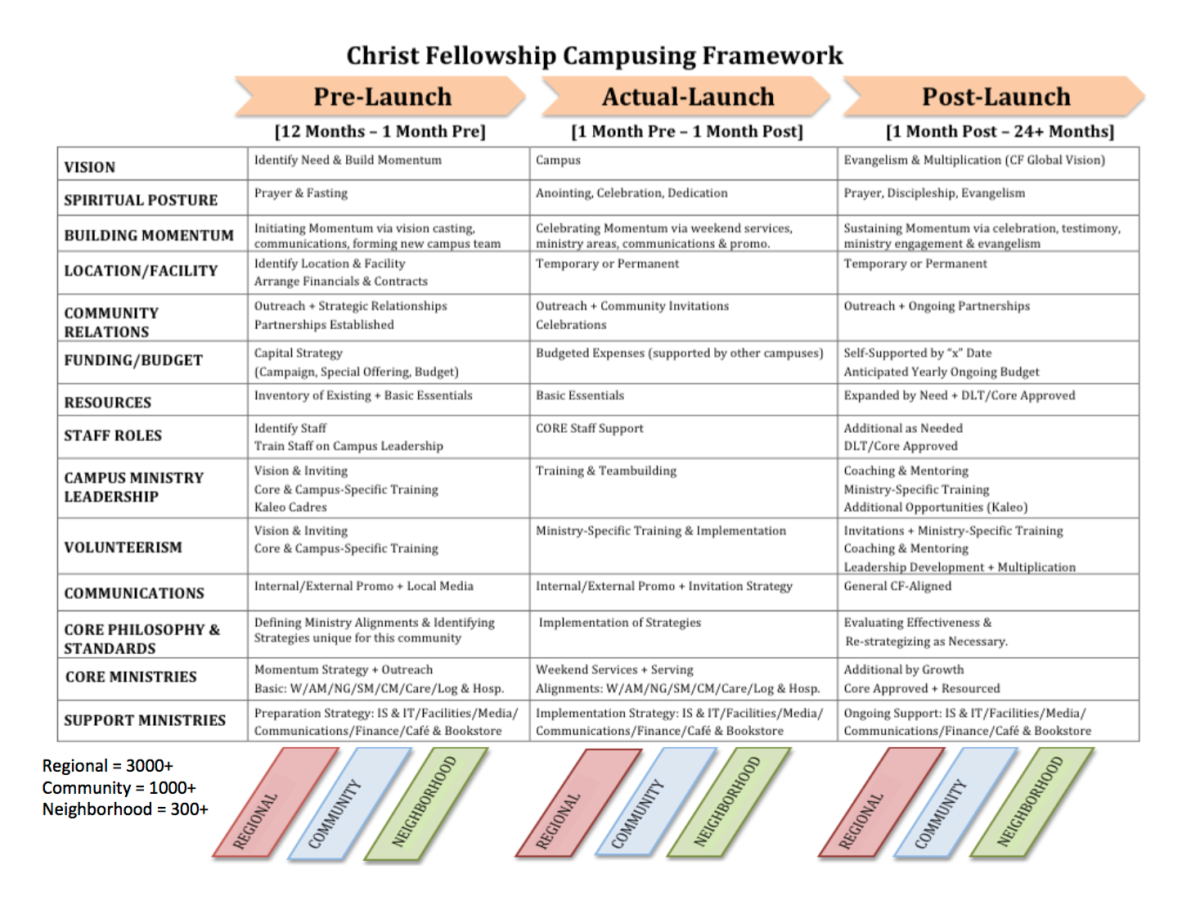Article
How to Build Your Campus Launch Template
One of the biggest benefits to being multisite is that you can begin to build systems that allow you to launch new churches.

One of the biggest benefits to being a multisite church is that you can begin to build systems that allow you to launch new churches/campuses and get better each time. However, knowing when and how to implement systems is important. If you are too systematic early on, you’ll stifle energy and potential. On the other hand, if you just look at the next 6 months and don’t keep an eye on the long-term systems you want to develop, you’ll lose valuable information that will help your church grow into something easy to scale and replicate.
Keeping the big picture in mind, here are some ideas for how to begin building a template for your future campus launches without taking away from what you are building now.
1. Borrow from others…
There is no need to reinvent the wheel, so start with resources from this blog, ask others you may know, attend a multisite conference or go digging on the Internet. I heard it best described by Tom Lane from Gateway Church: “It was like we were driving cautiously in a snowstorm, but up ahead there was a car whose tail-lights we could follow, and that made such a difference.” Every church has something to offer, if you’ll just do a little research.
Our template is available for download. We don’t follow it exactly every time, but we use it as a reference to make sure we learn from our past launches.
2. … but be your own church
Having someone a few steps ahead of you to follow is incredibly helpful, but trying to be someone else isn’t fruitful. God has called you to be a unique expression specifically for the people you are called to serve. Resist the urge to copycat another church’s vision, plans or strategies. Learn from them, borrow from them and certainly be inspired by them, but don’t simply copy them. It won’t work for you, anyway, because you aren’t them.
3. Take notes as you go
Any church startup or campus launch has so much going on it is impossible for anyone to remember all the pieces that came together, so you have to write them down. Usually it is helpful to give this to someone who cares about these kinds of details. Look for someone with the gift of Administration – they tend to see long-term strategies and love building the system behind them.
Your first site might just be all the items that you did and what happened. By site two or three, those details should start to show patterns and trends that you know you’ll always want to replicate. As a small example, we always bring our staff from our other campuses for a workday at a new campus. We did this at an early site out of necessity, but when we skipped it for a later campus we felt the effects of “out of site, out of mind.” And since “Unity” is our first Core Value, it doesn’t feel like “us” if our whole staff hasn’t been through the building, prayed over the new team and invested a little sweat equity.
Be sure to watch for and document the unexpected things that make a big difference. A last minute change of location or needing to rally for the final payment of the new sound system might seem like something that would happen only once, but it could also translate into a strategy of “last minute momentum builders.” These are the stories that tend to inspire a young congregation that God is at work and turn start-up stories into church culture legends.
4. Spend time debriefing and editing your template
This is always hard to prioritize, but it will save so much time and energy if you don’t have to remember it later. Be sure to include input and perspective from all your key leaders, various teams in your launching campus and new campus, as well as anyone who helped you but might have an outside perspective (the Christian who owns the business next door to your meeting space, the construction foreman for your renovation, or your mentor and friends who are cheering you on.)
5. For your first site, don’t stress about the template
As one of those people who usually has the most fun building the system and writing the documentation (INTJ anyone?), sometimes my systems can “box in” what God really wants to do next. For your first site or two, keep good notes but don’t let the idea of a future system override your opportunity for innovation now. I don’t know one multisite church that could have predicted what God was going to do with their sites or the system they finally ended up creating. Build your system on fruit, not on theory.
Reflection Questions:
- Are you taking enough notes now so you don’t have to reinvent the wheel later?
- Whose taillights are you following? Who else should you be watching?
- Who on your team would love to be in charge of collecting information and helping you craft a template for future use?



